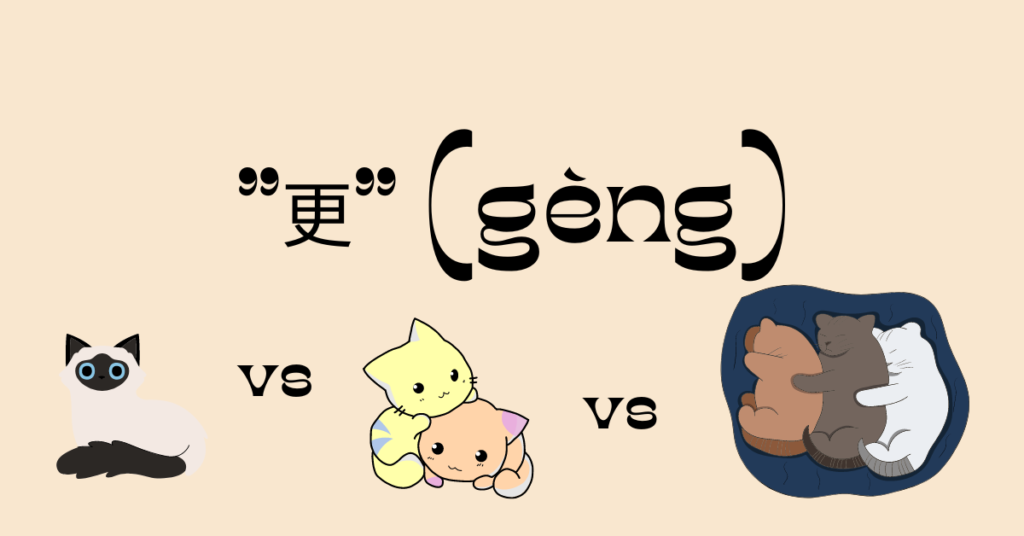
Here’s a detailed explanation of the usage of “更” (gèng) meaning ‘more’ or ‘even more’ in Chinese, along with examples:
1. 更 (gèng) meaning ‘more, even more’:
– Usage: “更” (gèng) is an adverb used in Chinese to indicate an increased degree or intensity. It is used to express the idea of ‘more’ or ‘even more’ in relation to a certain quality or action.
– Example 1: 我愿意为你做更多的努力。(Wǒ yuànyì wèi nǐ zuò gèng duō de nǔlì.) – “I’m willing to make even more effort for you.”
– Example 2: 这次比赛的观众比上次更多。(Zhè cì bǐsài de guānzhòng bǐ shàngcì gèng duō.) – “There are even more spectators in this competition compared to last time.”
In these examples, “更” (gèng) is used to indicate an increased degree or quantity, emphasizing the idea of ‘more’ or ‘even more’ than before.
This pattern is commonly used in Chinese to express a higher level, degree, or quantity of something. It emphasizes the amplification or intensification of a particular quality or action. Here are a few more examples:
– 我需要更多时间完成这个项目。(Wǒ xūyào gèng duō shíjiān wánchéng zhège xiàngmù.) – “I need more time to complete this project.”
– 他的表演技巧越来越好,越来越受欢迎。(Tā de biǎoyǎn jìqiǎo yuè lái yuè hǎo, yuè lái yuè shòu huānyíng.) – “His performance skills are getting better and better, and he is becoming more and more popular.”
By using “更” (gèng) meaning ‘more’ or ‘even more’, you can effectively convey an increased level, degree, or quantity of something in Chinese. It adds emphasis and highlights the intensified nature of the quality or action being described.
Dialogue:
Person A: 你觉得这个电影怎么样?
(Nǐ juéde zhège diànyǐng zěnme yàng?)
(What do you think of this movie?)
Person B: 我觉得这个电影比上一部更好看。
(Wǒ juéde zhège diànyǐng bǐ shàng yī bù gèng hǎokàn.)
(I think this movie is even better than the previous one.)
Person A: 真的吗?我对上一部已经很喜欢了。
(Zhēn de ma? Wǒ duì shàng yī bù yǐjīng hěn xǐhuānle.)
(Really? I already liked the previous one a lot.)
Person B: 是的,这部电影更精彩,更有深度。
(Shì de, zhè bù diànyǐng gèng jīngcǎi, gèng yǒu shēnghuà.)
(Yes, this movie is more exciting and has more depth.)
Person A: 那我更期待看这个电影了!
(Nà wǒ gèng qīdài kàn zhège diànyǐngle!)
(Then I’m even more looking forward to watching this movie!)
In this dialogue, “更” (gèng) is used to convey the meaning of ‘more’ or ‘even more’ when comparing two things. Person B responds to Person A’s question about the movie by stating that this movie is better than the previous one. Person B emphasizes the improvement by using “更” to highlight the enhanced qualities and depth of the current movie. Person A expresses increased anticipation for the movie based on Person B’s positive evaluation. The use of “更” intensifies the comparison, indicating a higher level or degree.
Exercise:
- Create your own sentences using “更” (gèng)